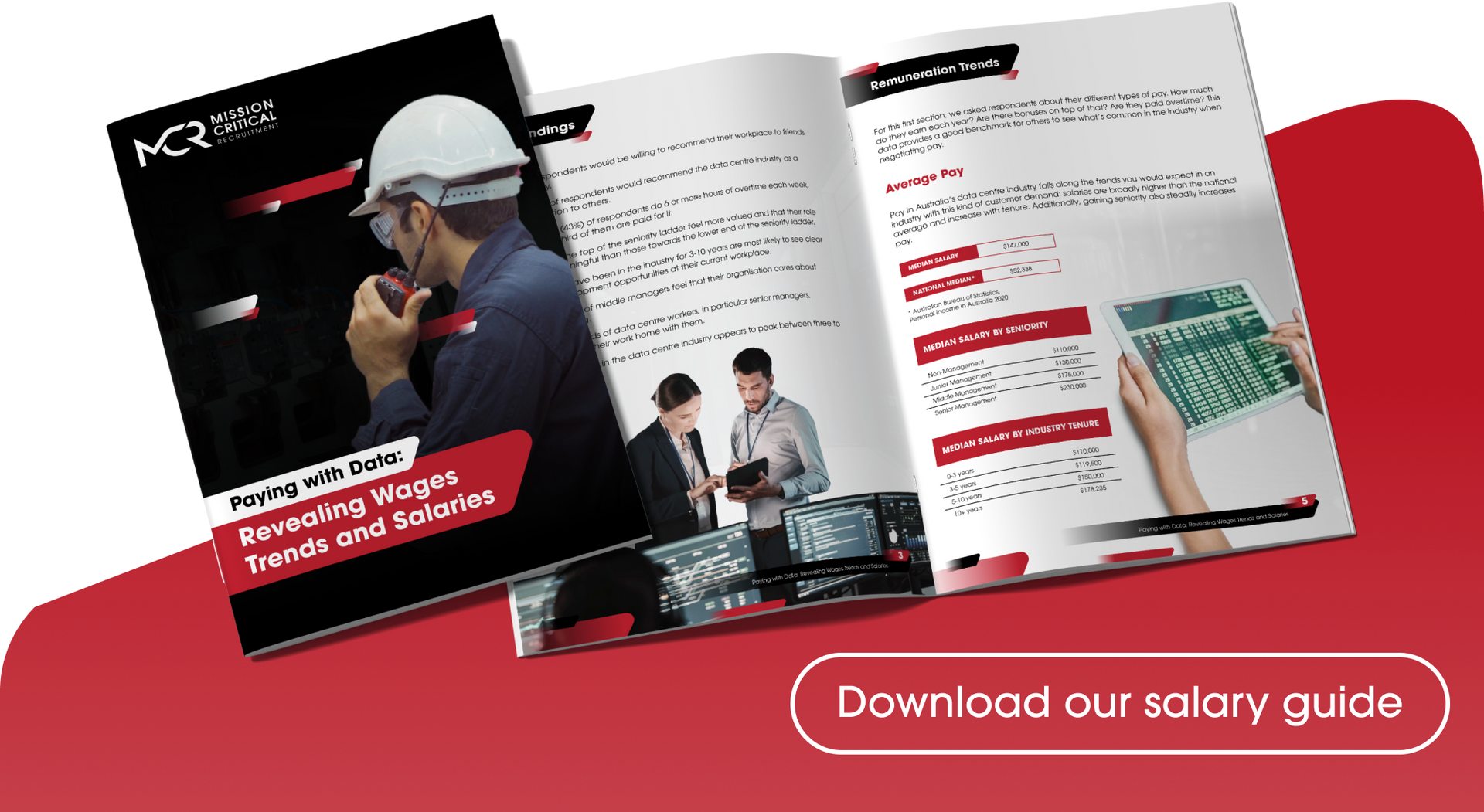Salary Negotiation Tips for Your Next Job Offer

Receiving a job offer is an affirming experience but negotiating your starting salary can make many professionals uncomfortable. You may be worried the employer will find your request unreasonable – or even walk away. But if you avoid negotiating your salary upfront, you will be missing an opportunity to earn more money in the long run.
Talent shortages are acute right now in the Data Centre space. In fact, the number of staff needed to fill Data Centre jobs in Australia, the Asia Pacific and around the world will grow from two million to 2.3 million by 2025, according to research from Uptime Institute Intelligence.
Negotiating your starting salary is a matter of being well-prepared beforehand and understanding the employer’s point of view. Here are the most effective ways to get ready for the conversation.
Know Your Number
When working out how to negotiate your salary, it’s best to avoid winging it and making up a number on the spot. Be clear on the range of pay you’re willing to accept, including your absolute minimum and the figure that you will be most happy with. Keep this information to yourself but be ready to counteroffer if the proposed package falls short of your baseline salary figure.
Recognise What the Market is Paying
As part of your negotiation preparation, do research on the salary trends for the same role to create an informed benchmark. Searching Google for average salaries in your geographic location is a good starting point, along with using websites like PayScale. Factor in points such as seniority and any specialist skills required in the job description.
Justify Your Counteroffer
Negotiating your salary in a new job can be a delicate process. You don’t want to undersell yourself, but you will need to back up your counteroffer with relevant data. Consider all the attributes that make you an ideal candidate for the role – your qualifications, experience and specialised skills.
Perhaps you have led teams through major projects or have gained valuable experience working overseas. Identify your unique selling points and explain to the Hiring Manager how he or she will benefit from hiring you.
Be Confident
Confidence is the core ingredient to a successful salary negotiation. After all, if you don’t back yourself, nobody else will!
Think about the Hiring Manager’s point of view. If they notice you are unsure of yourself or ambivalent, they may be inclined to take you less seriously. Projecting confidence (without being arrogant) will help Managers see you are capable of doing the job well.
Before you initiate a negotiation, practise your talking points. Run a mock negotiation with a friend and get them to throw in a curveball question or two. This can help you build up your confidence and think quickly on your feet.
Don’t Overlook Perks and Benefits
Money is a great motivator – but is it your only need? When you’re planning how to negotiate salary, consider the other factors that will make you happy working for that company. Can the organisation provide flexible working arrangements, car and phone allowance, generous vacation and parental leave, or access to wellbeing programs, for example?
For many people, a lack of career progression is enough to rub the shine off a job offer – research by Seek shows this is one of the top five reasons people leave jobs. Will the company support your professional development, such as reimbursement for training? This type of investment can add up over time and perhaps lead to greater advantages in the long run.
When Not to Negotiate
If you have already accepted the job offer, attempting to renegotiate pay may risk turning the offer sour for the employer. Being clear about your criteria before you sign on the dotted line will help you avoid unnecessary back-and-forth.
If an employer has put forward a salary that ticks all the boxes and is not a lowball offer, there is no need to make a counteroffer. Accept the offer and thank the manager graciously. Tell them you look forward to making a positive impact on their business.
Be aware of the employer’s constraints and budget as well. If they have already presented their best proposal, they may no longer be willing to negotiate when you are asking for more.
Summary
With so many professionals reluctant to negotiate a higher starting salary, knowing when and how to make a counteroffer can pay real dividends. Doing your homework, building up your confidence and understanding the employer’s position can lead to a successful negotiation.
Working with a Data Centre recruitment specialist will give you a solid footing from which to get the best salary possible. Recruiters know the job market intimately and have insight into what a broad range of employers are currently paying, so they can help you build your case for a successful counteroffer.
At Mission Critical, we link talented people to the best design, build and operate jobs in Data Centres across Australia and the Asia Pacific. Learn more about your salary by participating in our latest salary survey! Get in touch with our knowledgeable team today to access our specialist advice and land your next Data Centre role.















